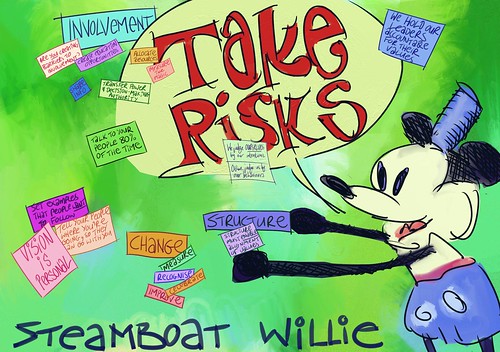.flickr-photo { border: solid 2px #000000; }
.flickr-yourcomment { }
.flickr-frame { text-align: left; padding: 3px; }
.flickr-caption { font-size: 0.8em; margin-top: 0px; }
Another week, yet another round of copyright news that moves from simply absurd into the realm of the truly frightening.
Canada has seen the re-launch of previously rebuffed copyright legislation, now known as Bill C-61. I’ll leave the detailed analysis to Michael Geist, but there’s so much I find depressing about this law and the attendant process that I really don’t know where to begin. I’m saddened that our government has ignored the voices of Canadian creators and (naturally) consumers, short-circuiting the consultation process that was promised… I’m disturbed that federal policymakers are clearly prepared to handcuff innovation to appease a handful of large corporate interests intent on preserving an inefficient business model. I despair that opposition in our House of Commons (which has backed down on so many other issues) will not amount to much, and that the citizenry will not see this as a serious issue (Geist disagrees)… The whole episode seems to confirm the direst predictions of Canadian nationalists who warned that tighter economic integration with our friends to the south would undermine our sovereignty, even on cultural issues. As Marc Lee of the CCPA points out, Canada is already running a hefty deficit in ‘cultural services’…
The educational implications of this Bill are classic bait-and-switch:
Bill C-61 creates for schools (but not others) a new special exemption from copyright, for PAM (publicly available material). If you are a school, you can just take and use stuff you find on the internet; the usual presumption of respect for the work of others is waived. Then it hedges this privilege to plunder with complications. Not if it’s under a TPM (a digital lock). Not if the school “should have known” it’s made available without the owner’s consent. And not if the creator has attached to the work a notice saying “schools, no plundering please.”
…It’s as if the drafters of C-61 are telling us, don’t make your work available, don’t provide access. Lock it up. Hedge it about with warnings, threats, and notices. And if you don’t, it’s your own fault.
And at the same time it is telling users, even privileged ones like schools, that copyright will be an endless headache for them, that compliance will always be difficult and time-consuming and fraught with uncertainty.
Now I direct your attention to a new policy from the Associated Press that demands payment from bloggers for quoting as few as five words from an article:
Welcome to a world in which you won’t be able to effectively criticize the press, because you’ll be required to pay to quote as few as five words from what they publish.
Welcome to a world in which you won’t own any of your technology or your music or your books, because ensuring that someone makes their profit margins will justify depriving you of the even the most basic, commonsensical rights in your personal, hand-level household goods.
(If that last paragraph seems hysterical, consider the poor saps who played by the rules and rented — while they thought they were purchasing — files from MSN Music.)
More from D’Arcy, who has started up a lively discussion in the comments on whether EduBloggers might capitalise on the AP policy by working as digital rights bounty hunters…
See also this video on Copyright Criminals, one in which Alec Couros expands his dramatic range from his usual typecasted fare…
My natural pessimism aside, there is one truth I take away from all of this. Those of us who work in education and public research have no choice but to embrace open distribution and licensing models. I don’t see how we can continue to hand over control of our work to entities that profit from selling it back to us… It’s clear how that narrative plays out.



I went from homeless guy to criminal. Quite the range.
Thanks for your post! I saw the piece from AP today … ridiculous, but I guess this mentality continues to be prevalent for those who do not realize the world has changed. Unfortunately, our government also appears to have been sleeping for the past 10 years or so.
You know I’ve been reading you for quite a bit know (and thank you, BTW for your wonderful site).
It’s funny, but I came into this a person who thought the higher idea in educational reform was net-enabled learning. Don’t get me wrong — I was always a strong opposer of copyright — but saw that as a smaller issue, a second level thing under this huger idea of the Network.
Maybe it’s going through Kelty’s book — but I’ve started really coming to terms with the idea that openness and hackability are really ideas more important than the network, at least for the moment. Or more succinctly, they are first ideas we must posses to truly understand the network — because the network, to some extent, is how we deal with a hackable, shareable world. Take away the hackable, shareable world, and what’s left for the network to do? Mail Hallmark e-cards or something I suppose.
You need problems of sharing and openness to get people to understand the significance of the network…
Sorry, I’m probably years behind you on this…
@Alec and Mike – both of your comments point to the mindset issue, which is grounded in previously dominant media, and I hope I can write the follow-up post your that your observations have gotten germinating in my mind.
Mike, I read your blog, and if there is one thing it ain’t it’s “behind” anybody – especially a Canadian dirtbag like me!